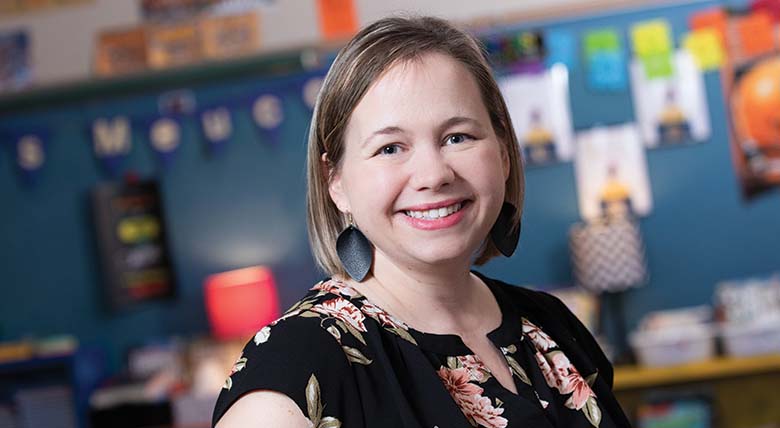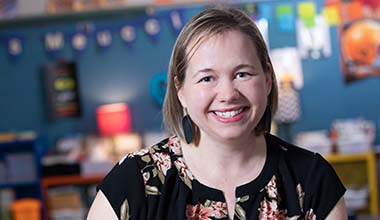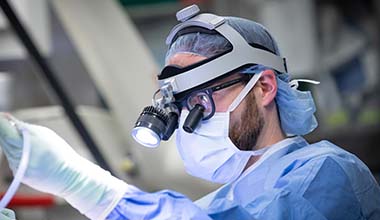
Brain Surgery Can't Stop This Teacher
Fourth-grade teacher K.D. Meucci was two weeks away from the new school year when she started to feel light-headed. That feeling increased over the next few weeks as she also developed vision problems.
Knowing something was off, she went to the ER. Imaging tests revealed a meningioma (a brain tumor) pushing on her optic nerve and her frontal and temporal lobes.
She was transferred to Allegheny General Hospital for overnight observation and more tests. She met Dr. Matthew Shepard, a neurosurgeon with AHN Neuroscience Institute, the next morning. He said, “Go home and spend the weekend with your family,” K.D. said. “We’ll see you next week for brain surgery.”
Specifically, a craniotomy, a surgical procedure that involves removing a piece of the skull to access the brain.
Preparing for the worst, hoping for the best
K.D. has two children who were four and six at the time. “I told them what Dr. Shepard told me,” she said. “‘It’s a typical surgery. It’s going to be okay.’” Then she wrote in their journals that she would always love them, had her sister promise she’d fill in for her at their weddings in case she didn’t make it, and tucked a copy of Mr. Walker Steps Out by Lisa Graff into her hospital bag.
“I have a Facebook group called Franklin Bedtime stories,” she said. Her surgery was Wednesday. Every Thursday, she or another teacher at the school read to all the kids at Benjamin Franklin Elementary School. “It was my turn to read. I felt compelled to keep it up.” It also gave her hope.
A skilled and caring team, an innovative tool
The size and location of the tumor demanded ultimate precision. The meningioma was entangled among critical blood vessels. This called for Gamma Knife surgery, a non-invasive alternative for complex and difficult brain conditions.
We’re proud to be among select centers of excellence utilizing the innovative Gamma, which isn’t a knife at all. It’s a high-precision instrument that involves no scalpel or incision. Instead, it uses precisely focused beams of radiation to control malignant and nonmalignant tumors, as well as vascular and functional disorders in the brain, without harming surrounding healthy tissue. “Patients are in and out of the hospital in a day's time,” said Dr. Shepard. “And back to their normal routines in no time.”




An exceptional outcome
The surgery went according to plan. Dr. Shepard was able to remove the tumor completely. And K.D. was able to do her Facebook live from her ICU Bed, assuring the kids she was just fine.
“Dr. Shepard was so patient and supportive. He explained everything. He comforted me. When I went into surgery, I remember looking at him and saying, please just let me live. He held my hand and said I will do my best. And when I came to, he was there, doing my neuro exams, asking me how I was doing,” K.D. said. “The nurses were excellent, too — checking in on me. Cracking jokes, which I needed. Cheering me on.”
But here’s the best part: The tumor was benign. And within months, K.D. was back at school, back at coaching both her kids’ soccer teams, and back in volleyball league.
Dr. Shepard saved my life,” she said. “The entire team made a huge difference in my recovery. The level of care I received from the doctor, the nurses, and the staff was top-notch.”
K.D. will continue to have regular MRIs to ensure the tumor doesn’t grow back. “I told Dr. Shepard that he’s stuck with me forever. He can’t get rid of me,” she said. “We’ll have these appointments for the next 40 years — basically until I’m 80!”
Next level, neuro-oncology care — all right here
Dr. Shepard has always been fascinated with the brain, mind, and central nervous system. “Marrying them together is rewarding and humbling,” he said. “You have the ability to make profound impacts on people's quality of life and be there for them in critical moments in their lives.”
He’s also passionate about the personalized care we’re able to provide. “Two patients with the same tumor in the same location may have very different treatment regimens,” he said. “Understanding patients as whole individuals and not just a scan or a condition is key to getting them back to what they want and like to do as quickly as possible.”
He can’t imagine doing what he does anywhere else. “AGH is an exciting place to practice,” he said. “As a center of excellence, we live and breathe complex neurosurgeries.”
If you or a loved one are diagnosed with a complex or difficult brain condition, be sure to discuss all the surgical and nonsurgical options available to determine the one that’s best for you and your life goals.
Learn more about neurosurgery at AHN Allegheny General Hospital.
Allegheny General Hospital (AGH) is the central home of the Allegheny Health Network (AHN) Neuroscience Institute. Our highly skilled neurologists and neurosurgeons use the latest therapies to save and improve lives.
Online scheduling with MyChart makes it easy to schedule an appointment that is convenient for you.





